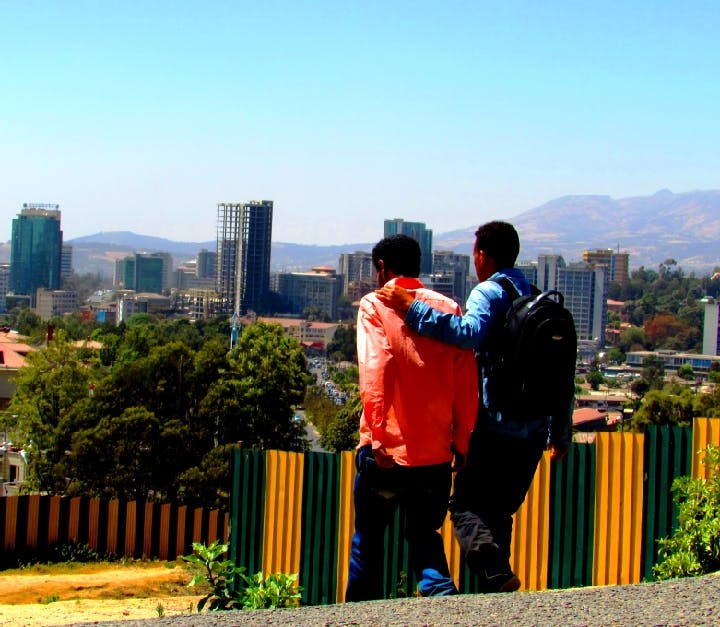Is Ethiopia the next Dubai?
– Carlo Massimo
The economy is growing and lifestyles are modernizing. But Ethiopia's rapid growth has been less than democratic — much like its benefactor, China.
Addis Ababa is fast earning a new nickname: the Dubai of Africa.
The popular image of Ethiopia, a land of emaciated children and ragged soldiers, is strikingly outdated. Ethiopia is on the rise, already the tenth fastest-growing economy in the world and Africa’s second most populous country. Between 2003 and 2013, Ethiopia’s GDP from hovered just around double the regional average; even after a sudden drop in 2013, it remains strong. Agriculture, manufacturing, and the service sector are booming. In the streets of Addis Ababa, Ethiopia’s capital, high-rise hotels and glitzy malls are replacing shacks and wandering goats. It is, tellingly, the seat of the African Union.. To judge from the street scene, Ethiopia is now bright star in the African constellation.
But as Hilary Matfess at Quartz reports, Ethiopia’s economic surge has not accompanied a strengthened democracy. The results of this spring’s national elections will be announced officially on 22 June, but on the streets of the capital, on the trams and in the office buildings, no one has any doubts over which party will emerge victorious. Current Prime Minister Hailemariam Desalegn, candidate of the Ethiopian People’s Revolutionary Democratic Front (EPRDF), has effectively already won.
The EPRDF has held power in Ethiopia for almost twenty years. To its credit, it has provided Ethiopia, (and, symbolically, Africans at large) with a left-nationalist alternative to the autocratic, Soviet-backed Mengistu government of the 1980s and the murderous nationalism of Mugabe’s Zimbabwe. And Ethiopia indeed owes much of its current prosperity to EPRDF administrations.
Still, the EPRDF’s attitude toward democracy and transparency seems to be one of moderation, at best (only the African Union received permission to observe this year’s elections, and their appraisal has looked rather uneasy). In 2009, an EPRDF government banned foreign nongovernmental organizations (NGOs), or native NGOs with any appreciable foreign funding, from researching or interfering in matters of Ethiopian democracy or human rights. Journalists have come under pressure not to probe too deeply into EPRDF affairs, and face jail time for their nosiness.
The parallels between China and Ethiopia are too intriguing to ignore.
What’s curious about the flashy new Ethiopia is its closeness to another rising power — China. All the new infrastructure, all of the shiny new developments making a Dubai out of Addis, are the fruit of Chinese investment. The city’s public transit tram cars are of Chinese make. The Chinese government donated $200 million to build the new African Union headquarters here. Hailemariam’s government signed a $300 million deal with a Chinese construction company to revamp the Addis airport. In 2013, a Chinese manufacturer spent $2 billion building shoe factories in Ethiopia. A dam on the river Tekeze, built and funded by Chinese companies, cost $365 million. China provides Ethiopia with everything from 3G and cellular service to military munitions.
China has long had a hand in Africa, hungry for the continent’s natural resources and cheap labor. While not as unapologetically violent as the Europe’s African empires, China has for decades engaged in a quiet colonial project in countries like Congo, dominating the trade in minerals like cobalt and turning a blind eye to the abuses faced by the men and women — and children — who work the mines. Similar projects in Ghana, Nigeria, and in African waters keep money and materials flowing eastward.
The parallels between China and Ethiopia, though, are too intriguing to ignore. Both countries are run by nominally-leftist parties, former opponents of Soviet hegemony and now interested in foreign investment. Both governments have rather alarming human rights records, especially China. Neither country seems particularly interested in reducing their carbon footprint. Dubai, which Addis has lately begun to resemble, shares all of these traits except the ex-left ruling party.
And all three countries are proudly on the rise, hurling themselves toward Western-style consumption, Western-style lifestyles, and Western-style networks of global exploitation.
* * *
The Source: Hilary Matfess, “Ethiopia’s economy is roaring but its democratic process continues to whimper,” Quartz, 29 May 2015.
Photo courtesy of Overseas Development Institute
